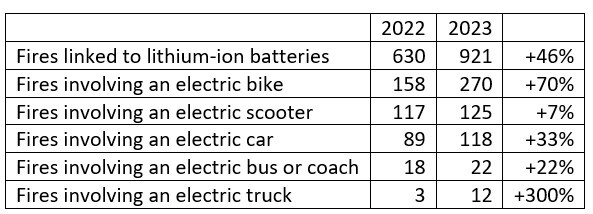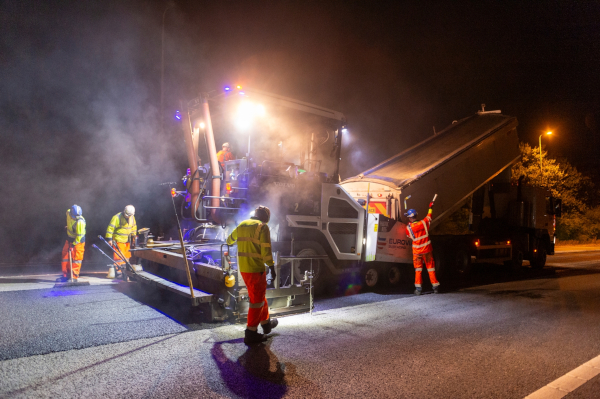New research has found that last year UK fire services attended almost three fires a day linked to lithium-ion batteries, which are now common in electric vehicles, bikes and scooters.
Freedom of Information requests from business insurer QBE found a 46% jump in the number of fires linked to the batteries in 2023 compared with 2022.
The data suggests suggests that almost a third (29%) of lithium-ion fires involved e-bikes – accounting for 270 recorded fires in 2023, up from 158 in 2022: an increase of more than 70%.
Fires involving electric buses increased by 22% last year while blazes involving electric trucks quadrupled. However, only seven fire services were able to report on these types of incidents. Fires involving e-scooters rose by 7% (117 to 125).
The data also shows that fires involving electric cars increased by 33% from 89 nationally in 2022 to 118 in 2023; however, there are now around 1.2 million zero-emission fully battery electric cars on UK roads.

The London Fire Brigade recorded the highest number of lithium-ion fires last year (378), followed by Lancashire Fire and Rescue Service (70) and Avon Fire and Rescue Service, which covers Bath and Bristol (57). Surprisingly, Greater Manchester reported fewer lithium-ion fires (24) than West Sussex (25), QBE said.
Adrian Simmonds, practice leader for property risk solutions at QBE Insurance, said: 'We see more fires linked to lithium-ion batteries, which is concerning. They burn differently from normal fires, so people attempting to put them out run more risks of injury.'
He added: 'We welcome the adoption of electric vehicles. To help with a safer roll-out, we are calling for more support for fire services to help improve education in dealing with the new risk profile.
'The UK government needs to impose more stringent safety requirements to reduce fire frequency. Increasing awareness of proper maintenance, storage and disposal of lithium-ion batteries is paramount to protecting people and property.'
Lithium-ion fires can result from 'thermal runaway', where batteries start to irreversibly overheat, usually due to impact damage, over-charging or of course over-heating.
The resulting explosive fire from the powerful incidents are significantly energetic and can potentially cause injury or even death.
QBE made a Freedom of Information (FOI) request on 31 January 2024 to 50 UK fire services, receiving data from 42 of them as of 17 May.































